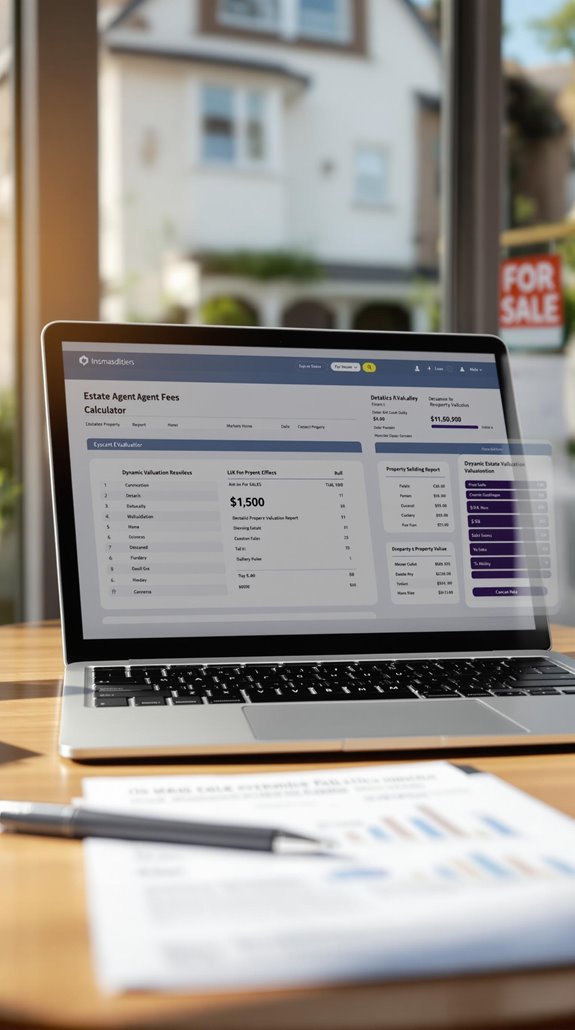I’ve watched countless UK homeowners lose thousands simply because they didn’t understand estate agent fees before signing on the dotted line. You’re likely facing the same scenario—wondering whether that 1.5% commission is fair or if there’s a smarter way to approach your property sale. The truth is, most sellers accept the first fee structure they’re presented with, but I’ll show you exactly how to calculate, compare, and negotiate these costs to keep more money in your pocket.
Key Takeaways
- Estate agent fees range from 0.9% to 3.6% of sale price, with sole agency typically costing 0.9% to 2.0%.
- Always add 20% VAT to quoted fees – a £5,250 fee becomes £6,300 including VAT.
- Online agents charge fixed fees around £500 versus high street agents costing £3,900 on £275,000 properties.
- Negotiate sole agency rates of 1.2% or less for high-value properties to reduce commission costs.
- Choose online agents for properties under £200,000, hybrid agents for £200,000-£500,000, traditional agents for higher values.
Understanding UK Estate Agent Fee Structures and Commission Rates

When selling your property in the UK, understanding estate agent fee structures can save you thousands of pounds and help you choose the right service level for your needs. I’ll break down the key commission models you’ll encounter.
Most agents charge percentage-based fees ranging from 0.9% to 3.6% of your final sale price. Sole agency agreements typically cost 0.9%–2.0%, while multi-agency contracts reach 2.5%–3.6%. For example, on a £300,000 sale at 1.5%, you’d pay £4,500. It’s important to note that typical estate agent fees in Scotland can provide a useful reference point for UK homeowners.
Online agents often offer fixed fees instead, requiring upfront payment but providing cost predictability. However, percentage models align your agent’s interests with maximizing your sale price—they only get paid when you do. Remember that top agents can achieve asking prices, which may justify higher fees through maximized seller profits.
Higher-value properties attract lower relative rates but higher absolute costs, making negotiation essential for substantial savings.
How to Calculate Total Estate Agent Costs Including VAT
Calculating your total estate agent costs requires factoring in VAT, which many sellers overlook until they receive their final bill. I’ll show you the straightforward method that prevents nasty surprises.
First, multiply your sale price by the fee percentage. For a £350,000 property at 1.5%, that’s £5,250. Next, add VAT by multiplying by 1.20, giving you £6,300 total. Remember that fees are typically one of the largest costs when selling property in the UK. Additionally, be aware that there are often disbursements involved in the selling process that can add to your overall expenses.
Always verify whether quotes include or exclude VAT—this catches many sellers off-guard. I recommend using online calculators to double-check your math and compare agents transparently.
Comparing High Street Vs Online Agent Pricing Models

How dramatically can your choice between high street and online agents impact your wallet? I’ve analyzed the numbers, and they’re eye-opening. High street agents typically charge 0.9% to 3.6% of your sale price, while online agents average £500 fixed fees regardless of property value.
For a £275,000 property, you’ll pay around £3,900 to high street agents versus £500 online – that’s £3,400 in savings. However, there’s a trade-off: high street agents handle viewings, negotiations, and sales progression, while online models require your hands-on involvement. Additionally, it’s important to consider the costs involved in selling such as solicitor charges and potential surveys, which can add to your overall expenses.
I’d recommend calculating your specific savings using the formula: traditional fee minus online fee. Research shows high street agents achieve a 5% higher sale price on average, which could significantly offset their higher commission costs. Consider whether you’re comfortable conducting viewings yourself and if local market expertise justifies the premium. Smart sellers scrutinize hidden costs before deciding.
Strategic Ways to Reduce Your Property Sale Commission
Since property sale commissions can consume thousands of pounds from your profit, I’ve identified five strategic approaches that’ll slash these costs without compromising your sale outcome.
First, I’ll negotiate aggressively by leveraging competition between agents and demanding sole agency fees of 1.2% or less for high-value properties. I’ll counter their initial offers by highlighting online agents’ fixed fees. Additionally, understanding the importance of local expertise can help in negotiating better rates with agents familiar with your area.
Second, I’ll implement performance-based structures using sliding scales—offering 1% below target price, 1.5% at target, and 2% above target.
Third, I’ll optimize selection using data-driven tools to compare agents’ success rates and achieved-price metrics.
Fourth, I’ll evaluate fixed-fee online alternatives for predictability. Additionally, I’ll explore quick buyer options that charge no fees to homeowners and can complete transactions within weeks.
Finally, I’ll minimize ancillary costs by securing multiple solicitor quotes and considering direct cash-buyer sales.
Choosing the Right Agent Type Based on Property Value

When selecting an estate agent, your property’s value determines which agent type delivers the best cost-to-service ratio. For properties under £200,000, I’d recommend online agents with fixed fees around £800-£1,500 – you’ll save considerably compared to traditional commission structures. If you’re selling between £200,000-£500,000, hybrid agents offer the sweet spot with base fees plus reduced commission rates of 0.5%-1.5%. It’s also wise to consider that solicitor fees can add to your overall selling costs, so budgeting carefully is essential.
For higher-value properties £500,000-£750,000, traditional agents become cost-effective since you can negotiate rates below 1.2% while getting full-service support. Premium properties over £750,000 justify specialist agents despite higher percentages – their targeted marketing reaches qualified buyers faster. Don’t forget discount agents for sub-£150,000 properties if you’re comfortable handling viewings yourself. Before committing to any agent, scrutinize their contract for hidden costs that could unexpectedly inflate your final bill. Match your property tier to the right agent type, and you’ll optimize both cost and service.
Conclusion
I’ve shown you how an estate agent fees calculator transforms your selling strategy. You’ll compare commission structures, factor in VAT, and weigh high street against online agents with precision. Don’t accept the first quote—use these calculation tools to negotiate better rates and identify hidden costs. Whether you’re selling a £200k starter home or £800k family property, you’ll make data-driven decisions that keep thousands in your pocket rather than unnecessarily padding agent fees.
References
- https://propertyrescue.co.uk/estate-agent-fees-calculator/
- https://wp.stolaf.edu/cila/files/2020/09/Teaching-at-Its-Best.pdf
- https://hoa.org.uk/estate-agent-fee-calculator/
- https://www.estateagenttoday.co.uk/breaking-news/2025/06/time-on-the-market-passes-200-day-mark-research/
- https://rentround.com/letting-agent-fee-calculator/
- https://hoa.org.uk/advice/guides-for-homeowners/i-am-selling/how-much-should-i-pay-the-estate-agent/
- https://www.ask.com/news/comparing-estate-agent-fees-uk-tips-finding-best-deal
- https://www.sold.co.uk/online-estate-agent/a-guide-to-estate-agent-fees-2024/
- https://cloudcogroup.com/estate-property-agent-fees/
- https://www.cavenders.co.uk/blog/estate-agents-fees

